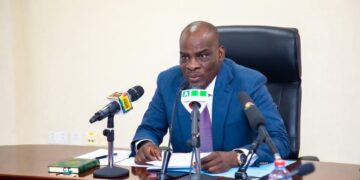 The 2024 elections delivered a resounding message: Ghanaians have had enough. The ruling New Patriotic Party (NPP) suffered its worst electoral defeat in decades, with voters holding the government accountable for Ghana’s prolonged economic distress. Years of spiralling inflation, a depreciating cedi, unsustainable debt, and deepening poverty—which reached 30.3% in 2023, according to the World Bank—fuelled frustration across the nation. This economic meltdown not only eroded livelihoods but also shattered public confidence, paving the way for the opposition National Democratic Congress (NDC) to claim victory.
The 2024 elections delivered a resounding message: Ghanaians have had enough. The ruling New Patriotic Party (NPP) suffered its worst electoral defeat in decades, with voters holding the government accountable for Ghana’s prolonged economic distress. Years of spiralling inflation, a depreciating cedi, unsustainable debt, and deepening poverty—which reached 30.3% in 2023, according to the World Bank—fuelled frustration across the nation. This economic meltdown not only eroded livelihoods but also shattered public confidence, paving the way for the opposition National Democratic Congress (NDC) to claim victory.The scale of the crisis the new administration inherits is monumental. Ghana’s fiscal and monetary challenges are compounded by low domestic revenue mobilization, weak banking sector reforms, and debilitating post-harvest losses in agriculture. Meanwhile, the cedi’s depreciation, largely driven by over-reliance on the dollar for trade and investments, has further eroded purchasing power. Ghana’s tax revenue-to-GDP ratio of circa 13.2%, well below its potential, exposes inefficiencies in policy and compliance. Add to this the burden of external debt restructuring and a fragile IMF-backed recovery program, and it becomes clear: the new government faces a Herculean task to rebuild the economy, restore stability, and regain the trust of the people.
To succeed, the NDC must go beyond rhetoric and undertake bold, transformative interventions. From revitalizing banking reforms and solving post-harvest losses to promoting fiscal discipline, de-dollarizing the economy, and fostering growth through strategic PPPs and investments, decisive action is paramount. This article outlines seven critical interventions which when implemented will raise the Ghanaian economy from its current turmoil and lay the groundwork for sustainable, inclusive growth.
1. Fiscal Policy Reforms: Reduce Government Expenditure
Ghana’s large fiscal deficit demands structural reforms in public spending. High government expenditure crowds out private investment and necessitates heavy taxation.
A lean and efficient public sector will create fiscal space to stimulate growth in key sectors.
2. De-Dollarization to Stabilize the Cedi
The demand for the U.S. dollar in real estate, car sales, and international trade erodes the value of the Cedi. Policymakers must act decisively to stem this tide.
These measures will ease pressure on the Cedi and restore confidence in local currency transactions.
3. Monetary Policy Adjustments to Drive Digital Transformation
Ghana’s current e-levy charges discourage the use of digital payment platforms, stalling financial inclusion and efficiency in transactions.
Promoting digital transactions will accelerate Ghana’s economic digitization, enhancing efficiency in commerce and tax mobilization.
4. Institutionalise the Credit Scoring System
The next major intervention is providing access to affordable credit; this remains a stumbling block for individuals and businesses in Ghana. The absence of a structured credit scoring system limits financial inclusion and asset acquisition.
Building trust in credit markets will deepen financial inclusion, open up the economy and enable economic participation at all levels.
5. Banking Reforms: Unlocking Credit for SMEs
Ghana’s banking sector, dominated by foreign-owned entities, often prioritizes lending to multinationals over local businesses, stifling small and medium enterprises (SMEs). Reforming this system is crucial.
By supporting SMEs, which constitute the backbone of Ghana’s economy, we drive local innovation, entrepreneurship, and job creation.
6. Solving Post-Harvest Losses (PHL)
Ghana loses 30-40% of its agricultural produce annually to poor storage, transportation, and processing infrastructure. This inefficiency exacerbates food insecurity and price volatility.
By tackling PHL, Ghana can stabilize food prices, enhance export competitiveness, and improve farmers’ livelihoods.
7. Public-Private Partnerships (PPPs) for Infrastructure
Ghana’s infrastructure funding gap continues to balloon, with excessive reliance on government borrowing worsening the debt crisis. Encouraging PPPs can serve as an alternative funding model.
With sound PPP frameworks, Ghana can unlock investment for critical infrastructure without escalating debt.
Conclusion:
Ghana’s economic crisis is a wake-up call demanding immediate, bold reforms. The solutions are clear: overhaul the banking sector to prioritize local business growth, implement a credit scoring system to spur investment and asset acquisition, and tackle post-harvest losses through modern infrastructure like storage facilities and irradiation technology.
Equally critical is a decisive push for de-dollarization to stabilize the Cedi, leveraging policy tools and partnerships like BRICS to reduce dependence on foreign currencies. Fiscal prudence must take centre stage—cutting government expenditure, driving efficiency in the civil service, and creating breathing space for businesses through lower taxes. Monetarily, eliminating barriers like e-levy charges can accelerate digital payments, boosting transparency and economic inclusion.
The time for fragmented, short-term fixes is over. Ghana’s path to recovery lies in coordinated, actionable reforms that drive local enterprise, attract investment, and ensure value for money. With the right mix of structural interventions, fiscal discipline, and innovative policies, Ghana can turn the current crisis into an opportunity for economic transformation.
The message is simple: bold action, not rhetoric, will secure Ghana’s economic future.
Author:
Nii Kpakpa Quartey is a highly accomplished finance expert, institutional reform strategist, and development economist with an illustrious career spanning over two decades. Renowned for his transformative leadership and innovative solutions, Nii has excelled in driving accountability, financial sustainability, and institutional efficiency at both national and international levels.
A graduate of London Business School (Executive MBA) and the University of Cape Coast, Nii is a distinguished member of ACMA, CGMA, and CA. His visionary leadership and expertise make him a trusted architect of sustainable economic growth and institutional reform.
























